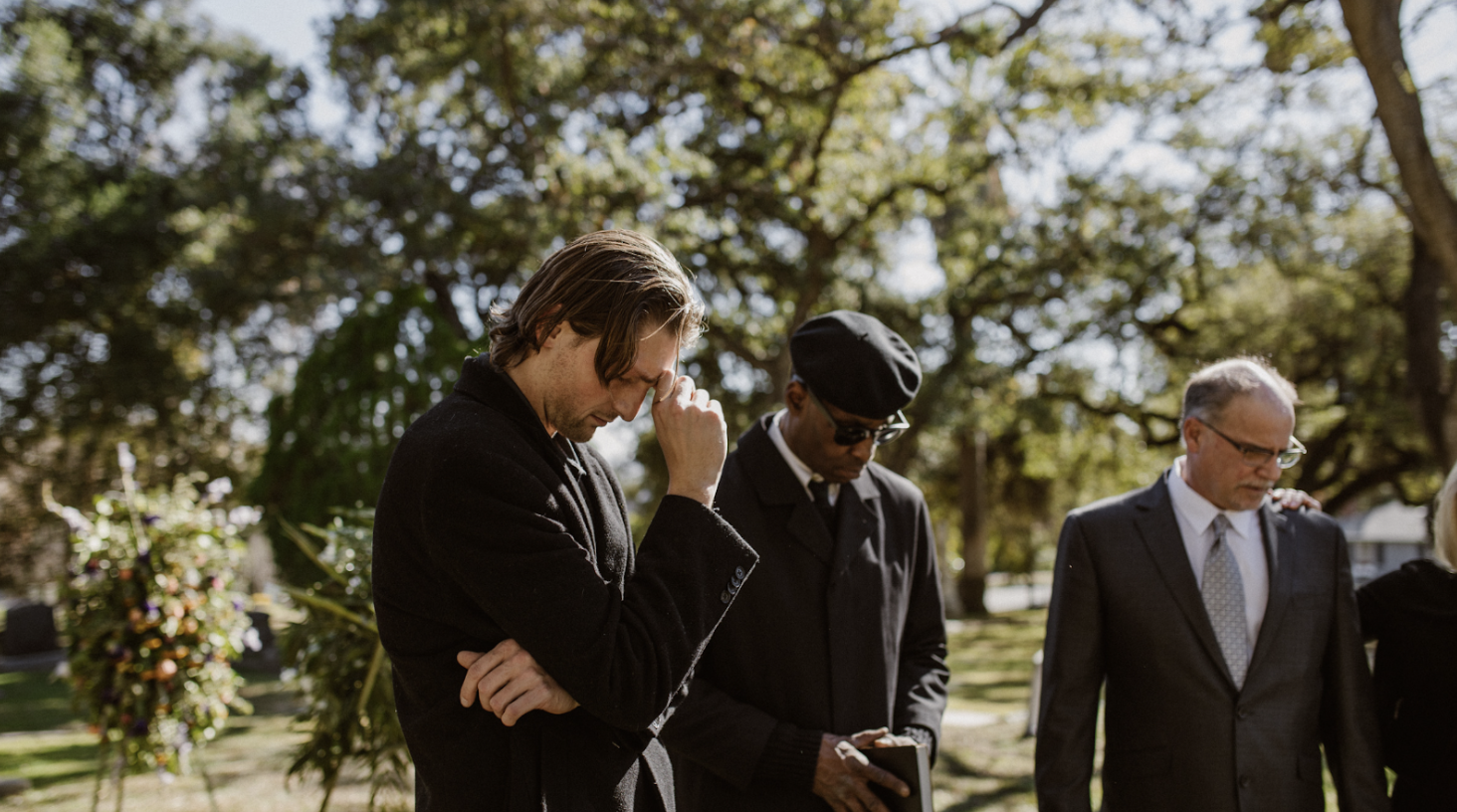Understanding the 7 Stages of Death Grief | Healing After Loss

Post contributed by First Session
Death grief is a complex and deeply personal experience that many individuals go through at some point in their lives. It is a natural response to the loss of a loved one and can profoundly impact a person's emotional well-being. In order to navigate this process, it is crucial to have an understanding of the 7 stages of death grief and the healing that can come after such a loss.
The Concept of Death Grief
Grief, at its core, is a natural response to loss. It is the emotional and psychological process that follows the death of a loved one. Death grief encompasses a wide range of emotions, thoughts, and behaviors that individuals may experience as they come to terms with the loss. It is a deeply personal journey and can vary greatly from person to person.
When someone we love dies, it can feel like our world has been shattered into a million pieces. The pain and sadness that wash over us can be overwhelming, leaving us feeling lost and alone. We may find ourselves questioning the meaning of life and struggling to make sense of the loss.
Defining Death Grief
Death grief is a multifaceted experience that involves emotional, cognitive, and physical responses to loss. It is important to note that grief is not a linear process with a clear beginning, middle, and end. Rather, it is a complex and ever-changing journey that often lacks a definitive timeline.
During the grieving process, individuals may experience a rollercoaster of emotions. One moment, they may feel a deep sense of sadness and despair, and the next, they may experience moments of acceptance and even joy as they remember the happy times shared with their loved one.
It is not uncommon for individuals to also experience physical symptoms of grief. These can include fatigue, changes in appetite, difficulty sleeping, and even physical pain. The mind and body are intricately connected, and the loss of a loved one can have a profound impact on both.
As you navigate through the complexities of death grief, ensuring you have the right support is vital. Online resources like First Session can help you find the right therapist sooner, facilitating meaningful human connections to assist you on this journey.
The 7 Stages of Death Grief Explained
The 7 stages of death grief, as theorized by psychiatrist Elisabeth Kübler-Ross, provide a framework for understanding the emotional process that individuals may go through when confronted with a loss. It is important to keep in mind that these stages are not necessarily experienced in a linear fashion, and individuals may move back and forth between stages.
Death is a universal experience that affects individuals in profound ways. The journey of grief is unique to each person, as it is influenced by factors such as the nature of the loss, the individual's personality, and their support system. Understanding the stages of death grief can help individuals navigate this complex emotional terrain and find healing.
Stage 1: Shock and Denial
Initially, individuals may feel a sense of shock and disbelief following a loss. This stage is characterized by a sense of numbness and a refusal to accept the reality of the situation. It serves as a defense mechanism that allows individuals to gradually process and come to terms with the loss.
During this stage, individuals may find themselves going through the motions of daily life, almost as if they are on autopilot. They may struggle to comprehend the enormity of the loss and may experience a sense of detachment from their emotions. It is important for loved ones to provide support and understanding during this time, as the individual may not be fully aware of their own needs.
Stage 2: Pain and Guilt
As the reality of the loss sets in, individuals may begin to experience intense emotional pain. This stage is often accompanied by feelings of guilt, as individuals reflect on what they could have done differently or the moments they may have missed with their loved one.
The pain of grief can be overwhelming, as it brings to the surface a range of emotions such as sadness, anger, and regret. It is important for individuals to allow themselves to feel these emotions and to express them in healthy ways. This may involve talking to a trusted friend or therapist, writing in a journal, or engaging in activities that provide a sense of release.
Stage 3: Anger and Bargaining
During this stage, individuals may direct their anger towards various targets, including themselves, their loved one, or even a higher power. They may also find themselves engaging in bargaining, hoping to change the outcome of the loss through promises or negotiations.
Anger is a natural response to loss, as it is a way for individuals to express their frustration and pain. It is important for loved ones to understand that this anger is not directed at them personally, but rather at the situation and the feelings of powerlessness that come with it. Providing a safe space for the individual to express their anger can be helpful in the healing process.
Stage 4: Depression, Reflection, Loneliness
In this stage, individuals may experience a deep sense of sadness and depression. They may withdraw from social interactions and spend time reflecting on their loss. It is common to feel a profound sense of loneliness during this stage.
Depression is a natural response to loss, as it allows individuals to process their emotions and come to terms with the reality of the situation. It is important for loved ones to offer support and understanding during this time, while also encouraging the individual to seek professional help if needed. Engaging in activities that bring comfort and solace, such as spending time in nature or practicing mindfulness, can also be beneficial during this stage.
Stage 5: The Upward Turn
As time passes, individuals may begin to notice small signs of improvement and hope. This stage is characterized by a gradual shift towards acceptance and a renewed sense of optimism. It allows individuals to start envisioning a future without their loved one.
During this stage, individuals may experience moments of joy and laughter, even though the pain of the loss is still present. They may find themselves engaging in activities that bring them a sense of purpose and fulfillment. It is important for loved ones to celebrate these moments of progress and to provide encouragement and support as the individual continues on their journey of healing.
Stage 6: Reconstruction and Working Through
During this stage, individuals actively work through their grief and start rebuilding their lives. They may seek professional support, join support groups, or find solace in creative outlets. It is a time of personal growth and self-discovery.
Rebuilding one's life after a loss can be a challenging and transformative process. It involves finding new meaning and purpose, redefining one's identity, and learning to navigate a world that has been forever changed. It is important for individuals to be patient with themselves and to allow the healing process to unfold at its own pace.
Stage 7: Acceptance and Hope
The final stage of death grief involves accepting the reality of the loss and finding a sense of closure. While the pain of the loss may still be present, individuals begin to embrace life again and find hope for the future.
Acceptance does not mean forgetting or moving on from the loss, but rather finding a way to integrate it into one's life and to continue living with a sense of purpose and joy. It is a time of healing and transformation, as individuals learn to carry their loved one's memory in their hearts while also embracing the possibilities that lie ahead.
Healing After Loss
Healing after the loss of a loved one is a highly individual process that requires time, patience, and self-compassion. It is important to acknowledge that healing does not mean forgetting or moving on from the loss but rather finding ways to live with the pain and honor the memories of the deceased.
The Importance of Grieving
Grieving is a necessary part of the healing process. It allows individuals to give themselves permission to experience the wide range of emotions associated with loss. By allowing oneself to grieve, individuals can gradually find meaning and purpose in their lives without their loved one.
Coping Mechanisms for Grief
There are various coping mechanisms that individuals may find helpful when navigating the grieving process. These can include engaging in self-care practices such as exercise, journaling, spending time in nature, seeking support from friends and family, and participating in therapeutic activities such as counseling or support groups.
Seeking Professional Help
While grief is a natural process, sometimes the pain and emotions individuals experience can become overwhelming and interfere with their daily lives. In such cases, seeking professional help from therapists or grief counselors can be beneficial. These professionals can provide guidance, support, and tools to help individuals navigate their grief and find healing. Therapist directory platforms like First Session in Canada can help connect you with the right therapist.
Self-Care During Grief
During the grieving process, it is crucial to prioritize self-care. This can involve practicing self-compassion, setting boundaries, and allowing oneself time to rest and heal. Additionally, engaging in activities that bring joy and comfort can help alleviate some of the pain associated with grief.
In conclusion, understanding the 7 stages of death grief and the healing that can occur after loss provides individuals with a framework to navigate the complex emotions and experiences associated with grief. It is important to remember that grief is a deeply personal journey, and there is no right or wrong way to grieve.
By allowing oneself to process and honour the loss, individuals can gradually find healing and eventually embrace life again with acceptance and hope.




